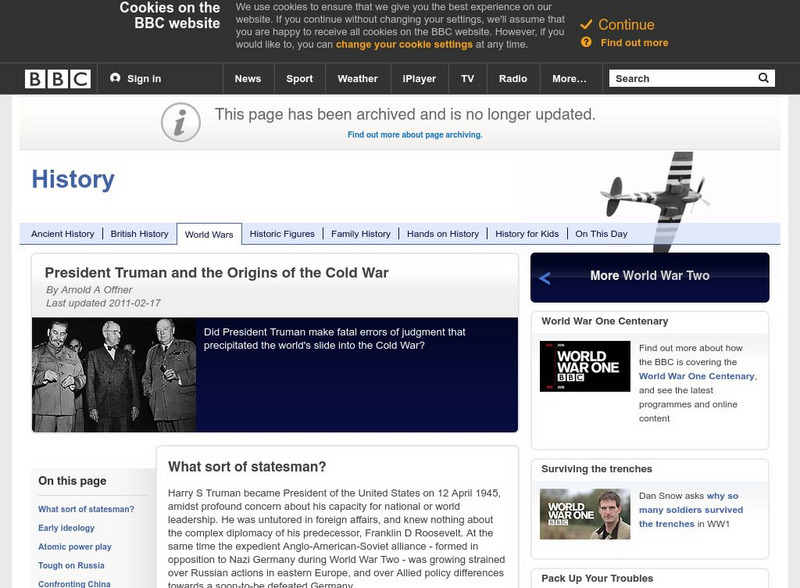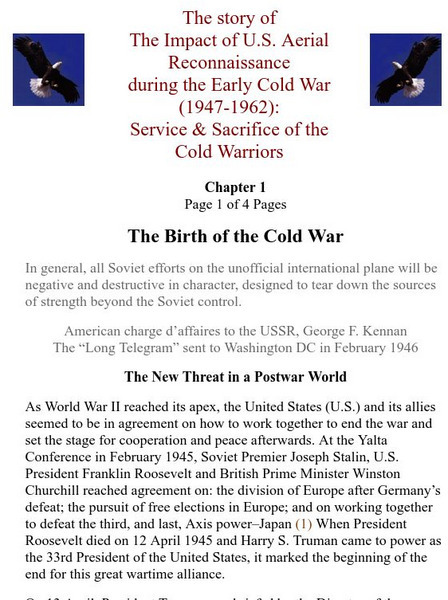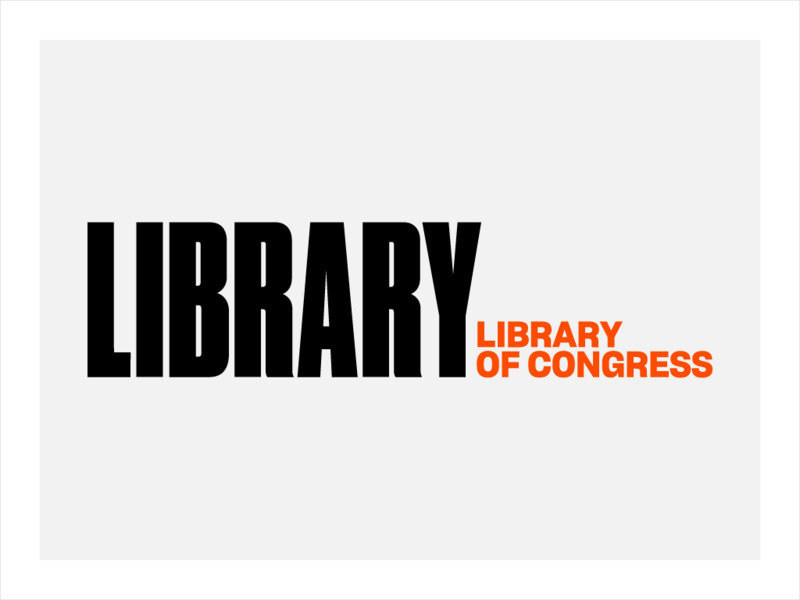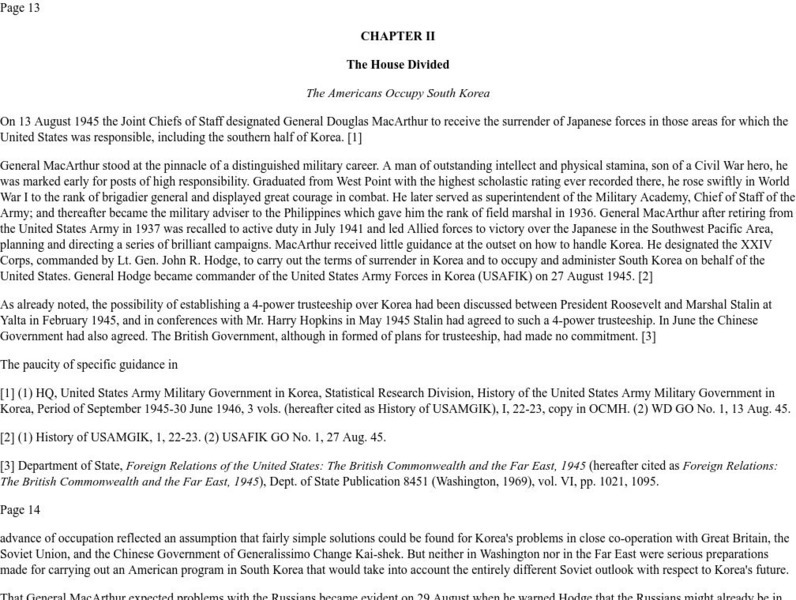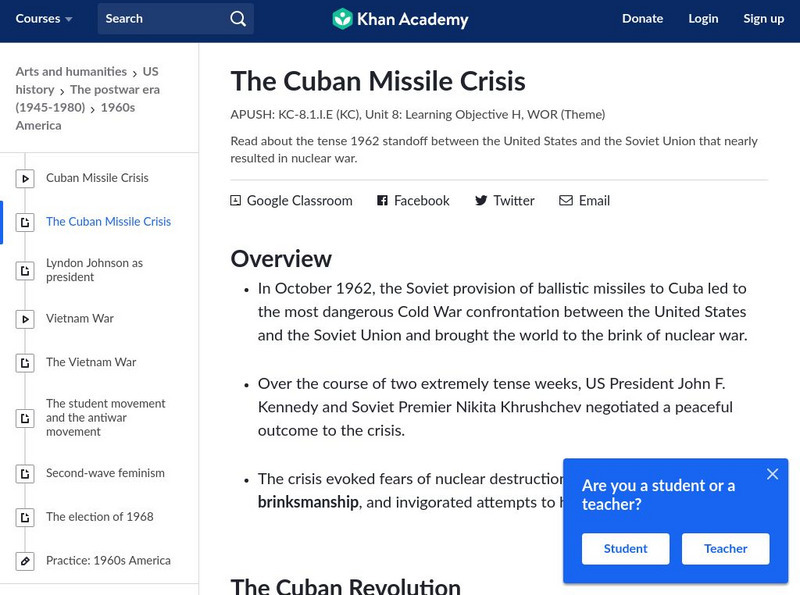Hi, what do you want to do?
BBC
Bbc: President Truman and the Origins of the Cold War
BBC correspondent Arnold A Offner discusses the role Harry S. Truman played in development of the Cold War. American history from a British point of view.
US Army Center
U.s. Army Center of Military History: Peace Becomes Cold War, 1945 1950
A discussion of historical events that led to the Cold War from the perspective of the U.S. Army. Particular emphasis is placed on military leadership and policy.
Country Studies US
Country Studies: End to the Cold War
This site discusses how US-Soviet relations took a dramatic turn for the better in 1990. Agreements and concessions made by both sides would eventually bring about the end to the Cold War.
Geographic
Photius: Workmall: Russia: Onset of the Cold War
This describes Russia in the post WWII era when it enters the Cold War. Describes Russian interests in Europe during the reconstruction phase as well as growing tension with the Western powers.
Country Studies US
Country Studies: Russia Reconstruction and Cold War
This article discusses Stalin's plans for Russia following World War II and examines how his decisions helped bring about the Cold War.
Library of Congress
Loc: Cold War: Cuban Missile Crisis
This brief Library of Congress site has info on the Russian's role in the Cuban Missile Crisis.
Central Intelligence Agency
Cia: At Cold War's End: Us Intelligence on the Soviet Union, 1989 1991
The CIA offers a collection of declassified documents that are Adobe PDF files and can be downloaded regarding the Soviet Union and from US Intelligence in the years 1989-1991. Also contains an introduction and complete overview of this...
Country Studies US
Country Studies: The Polish People's Republic
This article discusses the Soviet Union's influence in Poland following World War II and during the Cold War.
Other
Chronik Der Wende: The Fall of the Wall
This resource follows the events pertaining to The Fall of the Berlin Wall between October 1989 until March of 1990. Just click on any day and you can read what happened that day and see pictures.
Other
Cold War Story: Chapter 1
This site gives a very brief mention of free elections that were agreed to at the end of the WWII. Site gives a great overview of how the Cold War emerged out of WWII. A very nice analysis!
BBC
Bbc: Cold War: Reform, Coup and Collapse: The End of the Soviet State
A series of six pages that chronicle the demise of the Soviet Union.
OpenStax
Open Stax: Cold War to Culture Wars, 1980 2000: Political and Cultural Fusions
This section outlines political and cultural events of the 1980s, including the ERA movement, government failure to act on HIV/AIDS, the war on drugs and the conservative Christian reach. Questions for discussion and critical thinking,...
OpenStax
Open Stax: From Cold War to Culture Wars, 1980 2000: A New World Order
Page featuring information on a changing order both at home and abroad during the 1980s. Several links to primary source material, glossary and questions for student discussion.
US House of Representatives
History, Art, and Archives: Legislative Interests and Achievements
Women in Congress had an impact on every critical piece of legislation during the Depression through the Cold War. Examine their impact in Congress during these decades in the following summary of legislative achievements.
Library of Congress
Loc: Cold War Estrangement
This site from the Library of Congress discusses the progress of World War II, and the nature of the postwar settlement at conferences in Tehran, Yalta, and Potsdam.
Khan Academy
Khan Academy: Start of Cold War, Part 1: Yalta Conference and Containment
At the end of World War II, the Yalta Conference saw the splitting of Germany into four zones and the United States began a policy of containment of communism.
US Army Center
U.s. Army Center of Military History: Chapter Ii: The House Divided
This resource provides information on the period in Korea just before the Korean War, and on the partition of Korea by the United States and the Soviet Union.
US Department of State
Office of the Historian: The Cuban Missile Crisis, October 1962
This site gives a clear, succinct look at the Cuban Missile Crisis, its causes, and the results. See how direct and indirect communication between President Kennedy and Soviet leader, Nikita Khruschev, resolved this potentially horrific...
US Department of State
Office of the Historian: The Berlin Crisis, 1958 1961
Because Berlin was a divided city, between East and West, there was potential for diplomatic problems. Read about President Eisenhower's failed attempts to negotiate with Soviet Premier Khrushchev, and the negotiations between President...
Siteseen
Siteseen: American Historama: End of the Vietnam War
Provides a summary and detailed facts about the reasons for the end of the Vietnam war.
A&E Television
History.com: 10 Things You May Not Know About the Cuban Missile Crisis
Explore 10 surprising facts about the moment when the Cold War turned red-hot.
Khan Academy
Khan Academy: The Cuban Missile Crisis
In October 1962, Americans "peered into the abyss of nuclear destruction". Investigate how America got this close to nuclear war by reading the following summary, answering critical thinking questions, using the bibliography for further...
Google Cultural Institute
Google Cultural Institute: The Solidarity and the Fall of the Iron Curtain
Photographic essay explores the New European Order and the fall of the Iron Curtain.
Digital Public Library of America
Dpla: The Atomic Bomb and the Nuclear Age
The resources here, including letters, photographs, official documents, and film, represent various aspects and visions of the Atomic Age.
Other popular searches
- Events of the Cold War
- End of the Cold War
- Eisenhower and the Cold War
- Origins of the Cold War
- The Cold War 1945 1963
- The Cold War Era
- Causes of the Cold War
- Cold War in the u.s.
- Cold War in the Us
- China and the Cold War
- Cold War Around the World
- Roots of the Cold War





